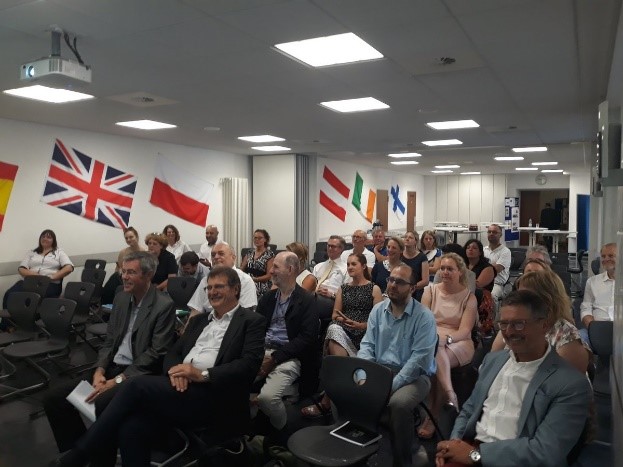KEYMOB 1st Multiplier Event in Stuttgart
10/07/2019

Kaufmännische Schule 1 (KS1) Vocational Education and Training (VET) centre hosted the first multiplier event of the Erasmus+ KA2 KEYMOB project. International partners gathered under the heatwave in Stuttgart on 27-28 June to work on a curriculum of transversal competences in the context of transnational mobility and discuss about skills acquisition through apprenticeship mobility.
Kaufmännische Schule 1 (KS1) Vocational Education and Training (VET) centre hosted the first multiplier event of the Erasmus+ KA2 KEYMOB project. Mr. Ulrich Kohler, Mr. Arnold Sulger and Mr. Thomas Bartel welcomed international partners in Stuttgart on 27-28 June. On the agenda, the partners agreed to work on a curriculum of transversal competences in the context of transnational mobility and discuss about skills acquisition through apprenticeship mobility.
On 28 June, a multiplier event was organised at the VET school. Mr. Uwe Peleikis presented KS1 dual system and international mobility projects with Spain, the UK and Singapore, among others. Afterwards, preliminary results on the analysis of key competences for mobility were presented before a full room of VET centres representatives from all over Germany, along with other stakeholders. The session was chaired by Mr. Josep Francí, from Barcelona’s Chamber of Commerce and KEYMOB project coordinator, and featured interventions by all project partners.
Mr. Ulrich Kohler introduced the results of a VET/apprenticeships mobility study carried out by the Erasmus+ German National Agency: 5.3% of mobilities in Germany are VET ones. He was followed by Ms. Liliane Esnault, from FREREF, who presented the competences that are expected to be acquired during a mobility period, those which are actually practiced during it, and the eventual learning outcomes by means of individual story examples. In this sense, an important role was given to validation of the outcomes and the methodology to integrating them into the learning programmes: “There are competences that are developed in mobility that need to be recognised after the youngster come back, even of it was not planned in the learning agreement,” she stated.
Mr. Óscar Chueca, from the Catalan regional ministry of education, introduced an analysis of transversal mobility for apprenticeships carried out in Catalonia. The representative from the training centre Strední škola ESOZ Chomutov got the floor to present their institution and approach to mobility. Finally, Noelia Cantero, EARLALL Business Manager, underlined the importance of multi‑stakeholder engagement for successful practices: cooperation of VET centres, regional and local authorities, businesses and research institutions, under the umbrella of national and international frameworks.
A round of questions related to validation, interaction between schools and regional authorities, and methodology brought the event to a conclusion. The next partner meeting will take place in Chomutov (Czech Republic) and will feature a second multiplying event during which further preliminary results of the studies under development will be presented.




